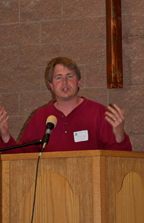The Just Trade Center on the Arizona/Mexico border promotes a new model of fair trade — fair trade plus — that goes above and beyond the traditional benefits of the system.
Instead of only paying a fair price to the farmers for their coffee beans, Café Justo, using the fair trade plus model, also keeps the processing, roasting, packaging, shipping, marketing and management of the coffee in Mexico. This system allows farmers to participate in and profit from the entire process, increasing profits and providing more local jobs.
With most other fair trade coffee companies, the growing is the only step of the process that takes place outside the United States or Europe.
“When the companies import the coffee beans and roast, package, market and manage them in the U.S., the majority of the profit comes from the activities in the U.S.,” said the Rev. Mark Adams, U.S. coordinator of Frontera de Cristo, part of Presbyterian Border Ministry.
With Café Justo, some profits from the processing steps in Agua Prieta return to communities in Chiapas, Narayit and Vera Cruz. The local co-op associations decide how to spend the money in their community; sometimes it goes to purchase equipment in town and other times it pays for some community improvement project. In either case, the local economy is benefited.
The roaster and grinder purchased by the Salvador Urbina members is used to roast coffee for the members for free and for non-members at a cost. The roaster and grinder add income for the local co-op, increasing local development.
But some obstacles pose challenges. One is that some ports of entry to the United States are more accessible than others. In Agua Prieta, the relationship between Frontera de Cristo and the customs agents is easier than in Tijuana because of the differences in scale.
“The port of entry into the U.S. for commercial goods and people at Agua Prieta and Douglas (Arizona) is infinitesimal compared to in Tijuana/San Diego,” said Tommy Bassett, director of the Just Trade Center. “So when we tried several years ago to open roasting facilities in Tijuana, we found that customs didn’t want to talk to us there. The quantity of coffee we wanted to cross was insignificant in comparison to container boxes full of goods and produce. They basically told us to get lost.”
Those lessons have taught Bassett a few things about getting new enterprises started.
“What seems easy in one place may not be so simple in another,” he said.
Another lesson came in the area of branding. The Tijuana roaster was going to roast coffee from the town of El Aguila and initially wanted to call that coffee “El Aguila.” Doing so would require building a whole new market for a new brand, a task that Café Justo was unprepared for. Now the coffee from El Aguila, Narayit, and Vera Cruz is also marketed as Café Justo.
“There was already a large and growing market for Café Justo in U.S. churches. Trying to change direction was far more difficult than we had predicted,” Adams said. “The good news is that we have expanded the model to three new communities and now have experience and know-how to coach other fair trade marketers on doing fair trade plus so more people can get their caffeine with a conscience.”

Tommy Bassett, director of Just Trade Center.
Café Justo is now trying to work with existing coffee cooperatives and fair trade organizations to move them in the direction of the fair trade plus model.
The project depends totally on contributions and profits from “Café Justo,” the book that Adams and Bassett co-authored on the Café Justo project. The book is available for $20.00 and may be ordered from the Café Justo online store.
Once a year, the Just Trade Center also hosts a Border to Border delegation. Beginning on the U.S./Mexico border and traveling to Salvador Urbina on the Mexico/Guatemala border, participants learn about the whole Café Justo enterprise.
The Rev. Parrish Jones lives in St. Augustine, Fla., and serves St. Johns Presbyterian Church, Jacksonville, Fla. as interim pastor.

